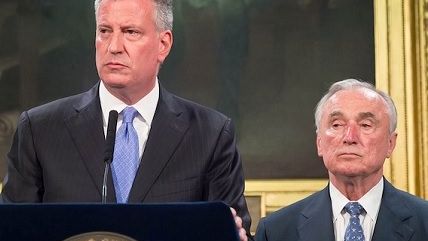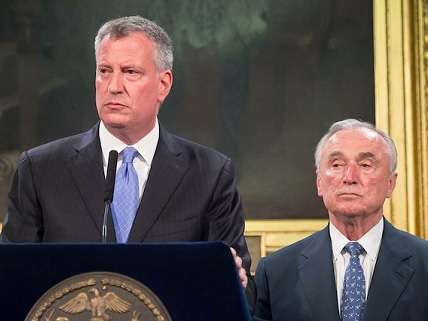Bill de Blasio, Progressive Hero, Scourge of the Poor
He backs strict enforcement of petty laws that disproportionately hurt the poor and marginalized.


In the last few weeks, a series of videos purporting to depict police brutality by the members of the New York Police Department (NYPD) have spread on the Internet. The most egregious showed the attempted arrest of Eric Garner for allegedly selling untaxed loose cigarettes. Cops placed Garner in what looked like a chokehold and the 400-pound asthmatic died in police custody. The incident was ruled a homicide by chokehold by the city's medical examiner. In another case, a cop appeared to use a chokehold on a pregnant woman caught grilling in front of her house. Another showed a cop appearing to head stomp a man police were attempting to arrest because they had seen him with a small amount of marijuana—it was at least the man's eighth arrest.
The substance of these incidents vary on the level and type of brutality while effecting an arrest but share one important trait: each incident began with a police engagement based on crimes that are non-violent in nature. Garner, before cops tried to arrest him, had adamantly denied that he was selling any untaxed cigarettes that day. The pregnant woman appeared only to be trying to cook some food on the sidewalk in front of her house. Marijuana is supposed to be decriminalized in the state of New York.
Yet in a press conference this week New York City's progressive mayor, Democrat Bill de Blasio, insisted the police department would continue to "strictly enforce" such laws as the ones that led to the series of controversial police interactions. "The law is the law," the mayor said. These kinds of laws, however, disproportionately affect the same kind of people—the poor and marginalized—that De Blasio and his ideological fellow-travelers adamantly claim to defend. Absent brutal encounters with police violations of petty laws can lead to thousands of dollars in fines, multiple court appearances, and even jail time. What amounts to a "minor inconvenience" in the eyes of the privileged political class that pushes these laws can have profound negative effects on the lives of normal people. Coupled with the threat of bodily harm or even death during the initial police encounter, such "petty" crimes become anything but for the people the government targets in its enforcement efforts.
The perverse impact is best studied with regards to marijuana. In New York City, young minorities are far more likely to be arrested on minor marijuana charges than white youth. This is fueled by the police department's long-standing practice of tricking people into publicly displaying their marijuana and therefore committing an actionable misdemeanor during stop and frisks. The vast majority of police targets during stop and frisks are young minorities, creating much of the disparity between who uses marijuana and who is arrested for it.
Other petty laws similarly disproportionately affect poor and marginalized people. The sale of untaxed cigarettes, for example, is a significant black market activity in any city that has sufficiently high taxes. The sale of loose cigarettes is predominant in poor communities, where smokers might only be able to afford to purchase one cigarette a time. Many corner stores in urban areas will sell loose cigarettes, though often not to white people for fear that they're actually undercover cops.
Likewise, you're far more likely to grill on a public sidewalk if you live in a home that doesn't include a front yard. You're less likely to have a front yard if you're poorer.
Bill de Blasio does not appear to see it that way. While he based much of his campaign on the idea of combatting income inequality in New York City, it seems his understanding of income inequality is severely limited. It encompasses only the belief that the government ought to force employers to provide higher pay and better benefits, and to force landlords and developers to offer discounts for a few poor people. The mayor doesn't have any interest in the structural issues surrounding income inequality: he has been an aggressive opponent of charter schools even though a decent education is the most cost-effective and efficient way to provide a young person a route out of poverty. He has pushed for developers to offer a portion of their rental units at highly discounted rates—raising the cost of rent for people who cannot take advantage of those discounts, many of whom are also poor or lower middle class.
And his reaction to the very public way his police department has been shown to disrupt the lives of minorities in the pursuit of petty, non-violent, and harmless "crimes" betrays a shocking lack of empathy for the struggles poor and marginalized people face on a daily basis in their lives. The law may be the law, but the law was made for man, not man for the law.
Demanding that people "correct their behavior," as New York City's police commissioner Bill Bratton said while standing at de Blasio's side at that press conference, and claiming that this was indeed what "democracy" was all about, another Bratton statement, shows a callous disregard for the very transparent role government plays in exacerbating inequality, but could be par for the course for progressives despite their loud protestations otherwise.


Show Comments (123)